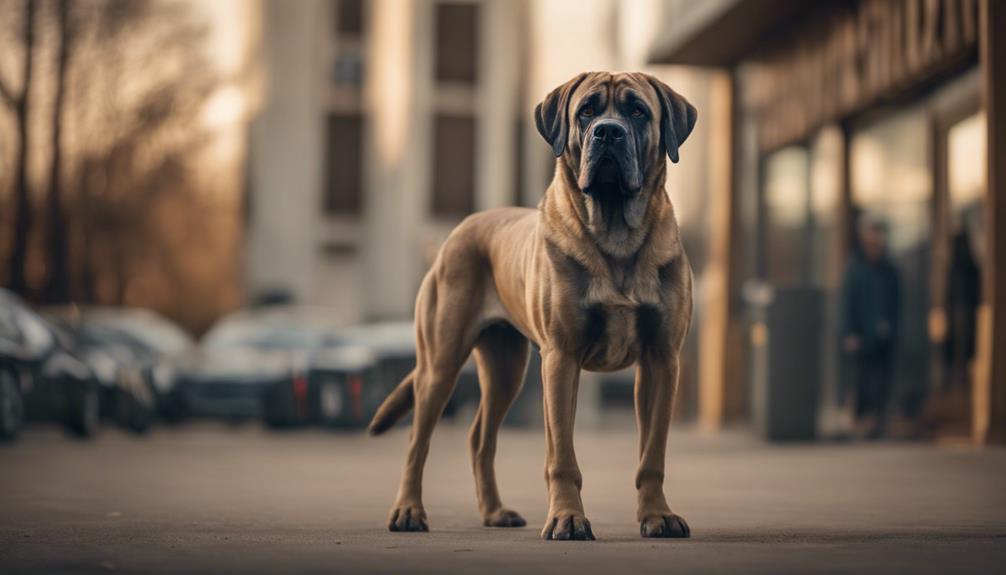🐾 Paw-some Partnership Alert! 🐾
As a pack of German Shepherd enthusiasts at MixGermanShepherd.com, we're always sniffing out the best products for our furry friends. Guess what? When you fetch something from Amazon through our links, we earn a little treat! 🦴
Picture yourself walking through a park, surrounded by a variety of dogs, each with their own distinctive features and temperaments. As you observe the Mastiff mix breeds trotting alongside their owners, you can't help but wonder about the fascinating blend of traits these unique crossbreeds possess. From the gentle giants to the spirited companions, Mastiff mixes offer a wealth of information waiting to be uncovered, shedding light on the unexpected combinations that make them stand out in the world of canine diversity. Explore the world of Mastiff mixes and uncover the intriguing characteristics that set them apart from purebred counterparts.
Key Takeaways
- Mastiff Mix breeds like Mastiffoundland and Mastiffhoula boast impressive size, appearance, and unique coat characteristics.
- Specific care requirements for grooming, exercise, and socialization vary among Mastiff Mix breeds.
- Training needs for Mastiff Mix breeds are based on their inherited instincts and distinct temperament traits.
- Mastiff Mix breeds inherit traits like loyalty, protectiveness, and agility from their parent breeds, affecting their behavior and characteristics.
Bullmastiff Mastiff Mix
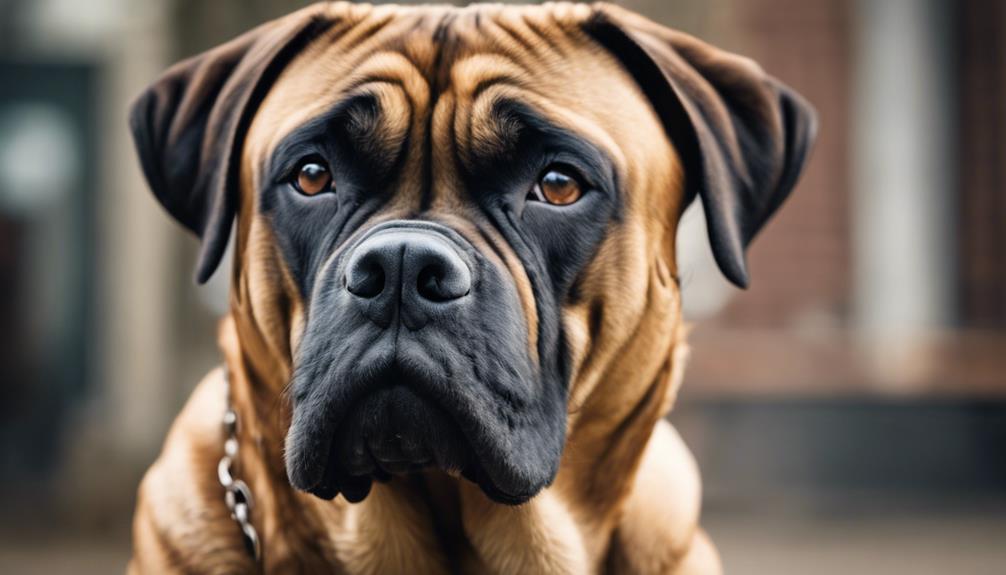
The Bullmastiff Mastiff Mix, or Mastiffbull, combines the robust qualities of the Bullmastiff and Mastiff breeds, resulting in a unique and formidable canine companion. These mixes, weighing between 100-130 pounds and standing 28-32 inches tall, possess a distinctive blend of characteristics from their parent breeds. One notable trait of the Bullmastiff Mastiff Mix is their affectionate yet overprotective nature. They are known to form strong bonds with their families and display a deep sense of loyalty and devotion.
Proper training is essential for managing the instincts of these loving family dogs. Their overprotective tendencies can be channeled positively through socialization and obedience training. Despite their vigilant behavior, Bullmastiff Mastiff Mixes can thrive in a loving and structured environment. It is crucial to establish leadership early on to ensure they understand boundaries while still feeling secure within the family unit.
With a lifespan of around 8-10 years, Bullmastiff Mastiff Mixes require consistent care and attention to maintain their well-being. Their size and protective instincts make them excellent guard dogs, but they also make affectionate companions for those who understand their needs. By providing a blend of love, training, and guidance, these mixes can truly shine as loyal and devoted members of the family.
Labrastiff: Labrador Mastiff Mix
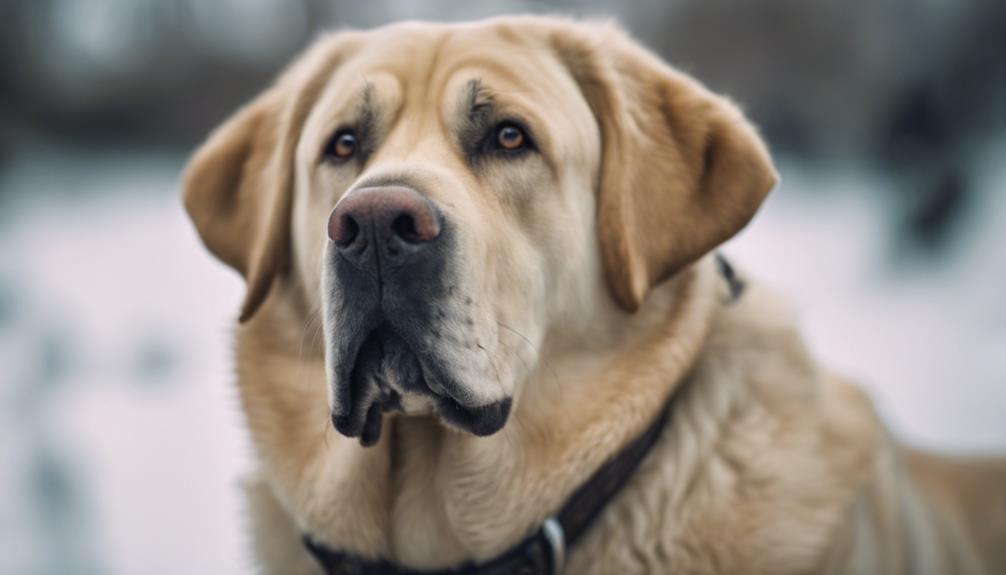
To explore the Labrador Mastiff Mix, known as the Labrastiff, is to uncover a blend of loyal companionship and robust qualities from the Labrador and Mastiff breeds. These mixed-breed dogs offer a unique combination of traits that make them wonderful additions to families seeking a devoted and friendly canine companion.
- Labrastiffs are a mix between Labradors and Mastiffs, resulting in a loyal and friendly nature that is great for families.
- They can weigh between 100-160 pounds and stand 25-30 inches tall, showcasing their large and sturdy build.
- Labrastiffs require regular exercise and mental stimulation to stay healthy and happy, as they have high energy levels.
- These mixes can have a variety of coat colors and patterns, inheriting traits from both parent breeds, which adds to their unique appearance and charm.
Labrastiffs are known for being affectionate and protective towards their families, making them excellent companions for households with children. Their loving and gentle demeanor, combined with their impressive size and strength, create a well-rounded pet that thrives on human interaction and socialization. If you are looking for a mix that embodies loyalty, friendliness, and a striking appearance, the Labrastiff might be the perfect choice for you.
Mastiffhund: Dachshund Mastiff Mix
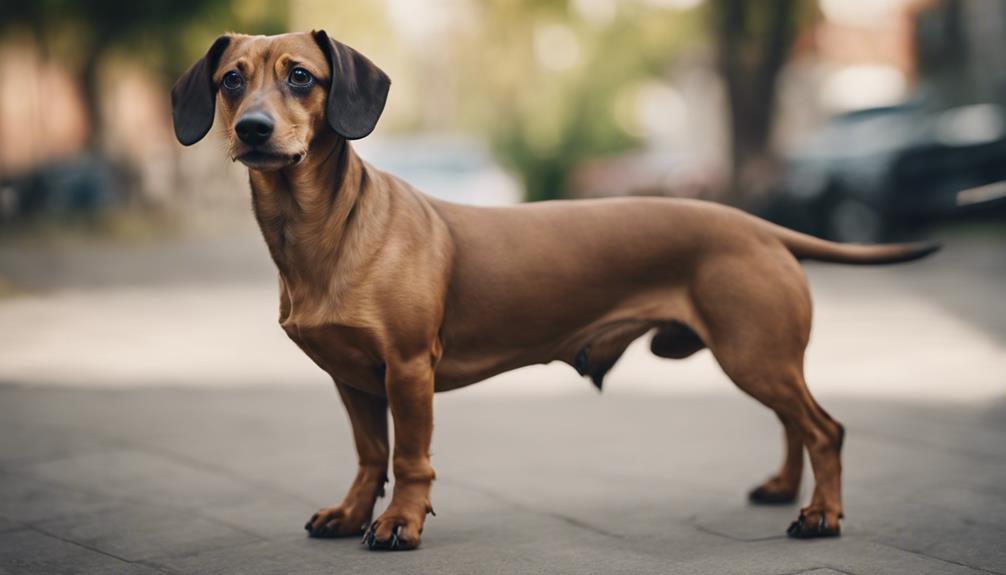
When considering the unique mix of a Mastiffhund, a blend of large and small breed characteristics emerges, showcasing a fascinating combination of traits from both the Mastiff and Dachshund breeds. The Mastiffhund inherits the Mastiff's protective nature, making them excellent watchdogs despite their smaller size compared to purebred Mastiffs. Additionally, they often embody the Dachshund's lively and courageous demeanor, resulting in a well-rounded companion with a blend of traits that cater to different aspects of their personality.
To further understand the characteristics of a Mastiffhund, let's delve into a comparison between the Mastiff and Dachshund breeds:
| Mastiff | Dachshund |
|---|---|
| Protective nature | Lively and courageous |
| Larger size and strength | Smaller body size |
| Loyalty | Playfulness |
| Adaptability |
Mastiffhunds are known for their loyalty, playfulness, and adaptability, making them suitable for various living environments. However, like all mixed breeds, they require early socialization, consistent training, and regular exercise to ensure their well-being and happiness. This unique mix offers a distinctive blend of characteristics that can make them excellent companions for those looking for a mix of large and small breed traits in one furry friend.
American Mastiff: Mastiff American Bulldog Mix
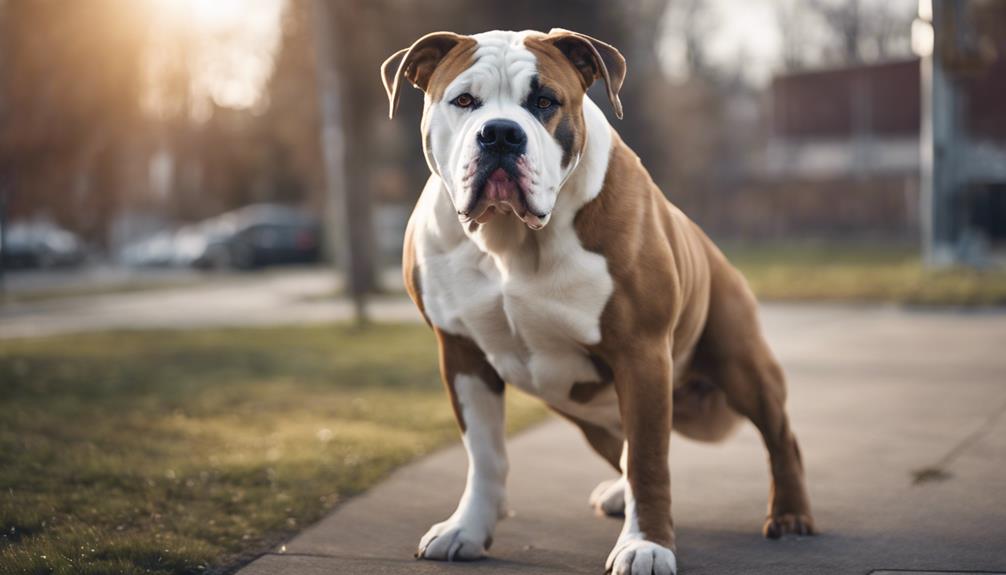
The American Mastiff, a mix of Mastiff and American Bulldog, boasts unique breed characteristics that set them apart from other dogs. Their temperament and behavior are marked by their loving and protective nature, making them excellent companions for families seeking a loyal pet. Health considerations such as regular exercise and grooming are vital to ensuring the American Mastiff's well-being and longevity.
Unique Breed Characteristics
Indicative of their Mastiff and American Bulldog heritage, Mastiff American Bulldog Mixes display a distinctive blend of loving loyalty and protective instincts. These mixes are vigilant and make excellent watchdogs due to their protective nature. They often have a striking brindle coat pattern, accompanied by a black mask and wrinkly skin. Training them requires assertiveness because of their size and strength. Despite their imposing appearance, Mastiff American Bulldog Mixes are known for their quiet tendencies and loving demeanor, making them great companions for those seeking a loyal and watchful pet.
Temperament and Behavior
With their unique blend of affection and vigilance, the Mastiff American Bulldog Mix embodies a loyal and watchful companion for families seeking a devoted protector. This mix is known for its gentle temperament, displaying a loving and affectionate nature towards its family members. However, their protective instincts shine through when they are alert and watchful around strangers, making them excellent guard dogs. Their loyalty is unwavering, and they thrive on forming strong bonds with their families. To ensure they reach their full potential as loving protectors, continuous training and socialization are crucial. By combining the best traits of the American Mastiff and the American Bulldog, this mix offers a unique blend of qualities that make them a truly special addition to any family.
Health Considerations
To address the health considerations of the Mastiff American Bulldog Mix, it is essential to be mindful of potential issues like hip dysplasia, cataracts, and digestive problems that may affect their well-being. When caring for your American Mastiff mix, remember to prioritize their health by following these guidelines:
- Regular vet check-ups are crucial for monitoring specific conditions like joint health issues and allergies.
- Providing high-quality food and ensuring proper nutrition play a significant role in managing the health of American Mastiff mixes.
- Be aware that the Mastiff American Bulldog Mix may be prone to certain health issues due to their genetics.
- Taking proactive steps, such as early socialization and training, can help mitigate potential health concerns in your American Mastiff mix.
Blue Mastiff: Blue Heeler Mastiff Mix
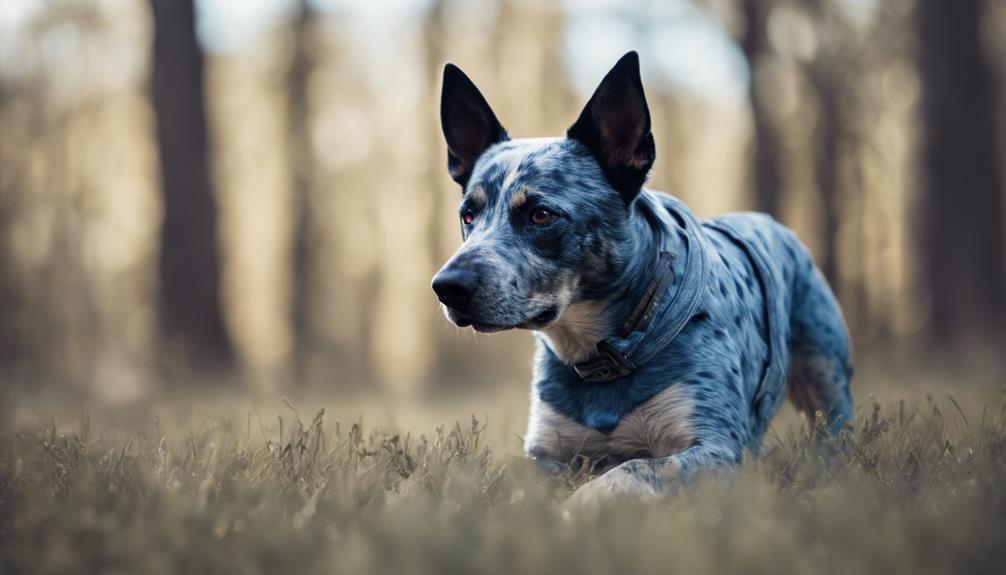
Combining the strength and intelligence of the Mastiff with the agility and energy of the Blue Heeler, the Blue Mastiff is a captivating hybrid breed worth exploring. This mix, also known as the Blue Heeler Mastiff mix, blends the Australian Cattle Dog and Mastiff breeds, resulting in a unique canine companion. Blue Mastiffs may inherit the blue coloring from their Blue Heeler parent, giving them a distinctive coat color that sets them apart. Known for their intelligence, loyalty, and protective instincts, Blue Mastiffs make excellent guard dogs and devoted family pets. However, due to their protective nature, early socialization and training are essential to ensure they grow into well-behaved and well-adjusted companions.
To provide a clearer picture, below is a table highlighting some key characteristics of the Blue Mastiff:
| Characteristic | Description |
|---|---|
| Coat Color | Unique blue coloring, possibly inherited from the Blue Heeler parent |
| Temperament | Intelligent, loyal, and protective, making them excellent guard dogs |
| Exercise Needs | Moderate exercise requirements to maintain their health and energy levels |
| Training Requirements | Early socialization and training are crucial to ensure proper behavior and adjustment |
With a blend of traits from both parent breeds, the Blue Mastiff offers a versatile and robust personality that can thrive in various environments, making them a fascinating choice for potential dog owners.
Mastiffoundland: Newfoundland Mastiff Mix
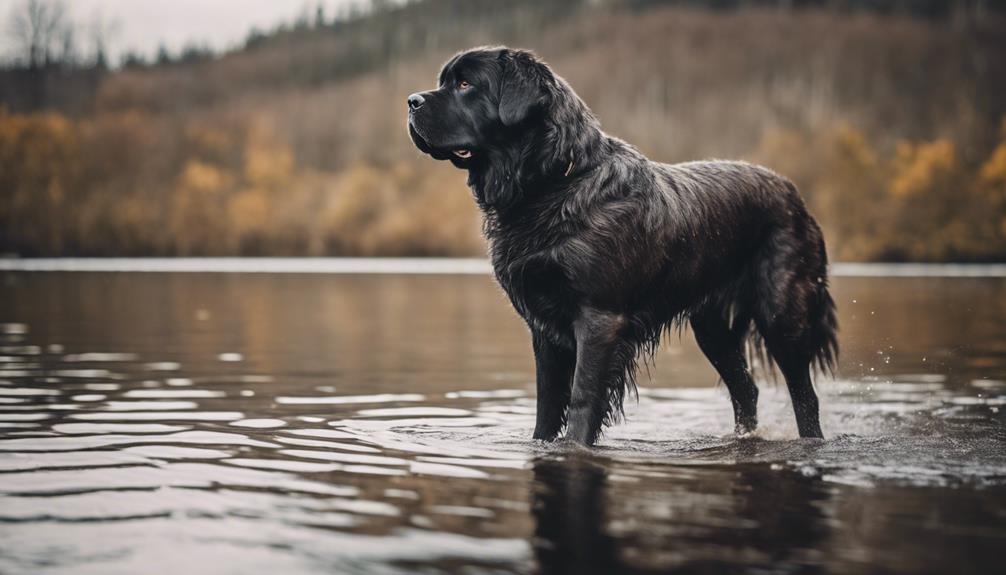
When considering the Mastiffoundland, you'll notice its impressive size and striking appearance, often resembling a gentle giant due to its Mastiff and Newfoundland lineage. Their temperament leans towards being affectionate and loyal, making them ideal family pets. Ensuring regular exercise and grooming routines will be crucial in maintaining the well-being of these large and loving Mastiffoundlands.
Size and Appearance
The Mastiffoundland mix impresses with its large size and striking appearance, combining the stature of a Mastiff with the distinct traits of a Newfoundland. These mixes can reach heights of over 30 inches and weigh between 130-180 pounds, showcasing their impressive stature. With a thick double coat like the Newfoundland, Mastiffoundlands may have colors ranging from black to brown to gray, adding to their unique appearance. This mix inherits the gentle and sweet nature of both parent breeds, making them affectionate and loyal companions. Mastiffoundlands require regular grooming to manage their coat, which can shed seasonally, and they thrive in spacious environments due to their large size.
Temperament and Behavior
Mastiffoundland, the delightful blend of Mastiff and Newfoundland breeds, exudes a gentle and affectionate temperament that makes them superb family companions. This mix is not only gentle and affectionate but also patient, loyal, and protective. Their behavior reflects a calm and loving nature, making them great with children and ideal for families seeking a devoted pet. Mastiffoundlands possess a strong sense of loyalty and may showcase protective instincts inherited from their parent breeds. Their temperament combines the best of both worlds, showcasing the size and strength of Mastiffs while maintaining a friendly and loving demeanor. With their gentle nature and innate loyalty, Mastiffoundlands excel as loving companions and devoted family members.
Exercise and Care
To ensure the optimal health and well-being of your Mastiffoundland, a consistent exercise regimen tailored to their specific needs is essential. Here are some key points to consider for the exercise and care of your Mastiffoundland mix:
- Engage in activities like swimming, hiking, and daily walks to provide physical and mental stimulation.
- Ensure ample space for your Mastiffoundland to move around and play due to their size and energy levels.
- Proper care and regular exercise can help prevent obesity and joint issues in Mastiffoundland mixes.
- Implement a structured exercise routine that caters to the individual needs of your Mastiffoundland to enhance their overall quality of life.
Mastiffhoula: Mastiff Catahoula Mix
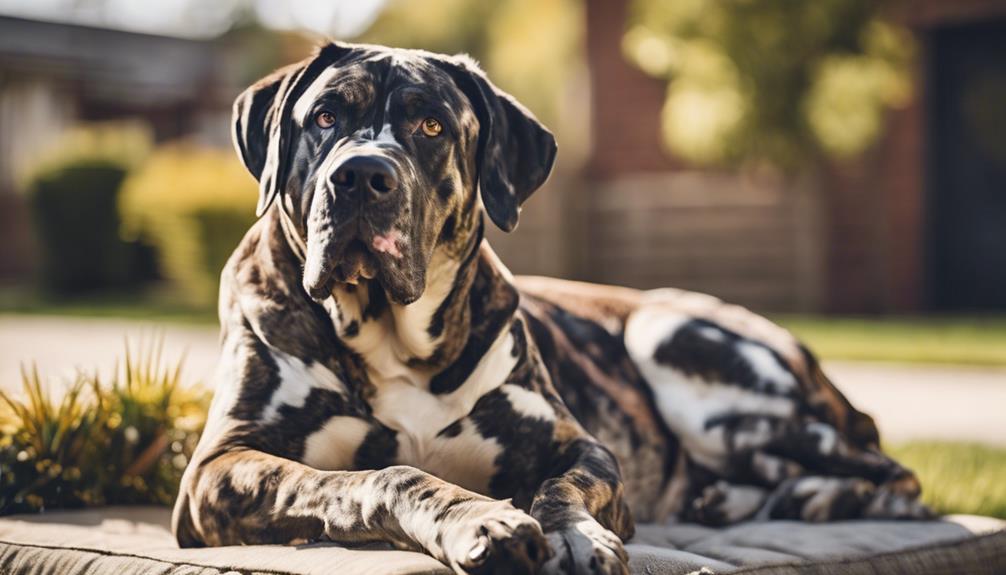
Mixing the powerful Mastiff with the versatile Catahoula Leopard Dog results in the unique and captivating Mastiffhoula breed. This mix inherits protective instincts, agility, and a strong guarding ability from both parent breeds, making them excellent watchdogs and loyal companions. One of the most striking features of Mastiffhoulas is their unique coat patterns, which can vary widely and showcase a blend of colors from the Mastiff and Catahoula Leopard Dog.
To ensure a well-rounded and well-behaved Mastiffhoula, early socialization and firm training are essential. These dogs thrive in a family environment where they receive regular exercise to keep them mentally and physically stimulated. Due to their large size, Mastiffhoulas are prone to hip dysplasia, so it's crucial to monitor their joint health and weight to prevent potential issues down the line. Additionally, keeping an eye out for any signs of eye problems or other joint-related issues common in both parent breeds can help maintain the overall health and well-being of your Mastiffhoula.
Mastifridge: Mastiff Rhodesian Ridgeback Mix
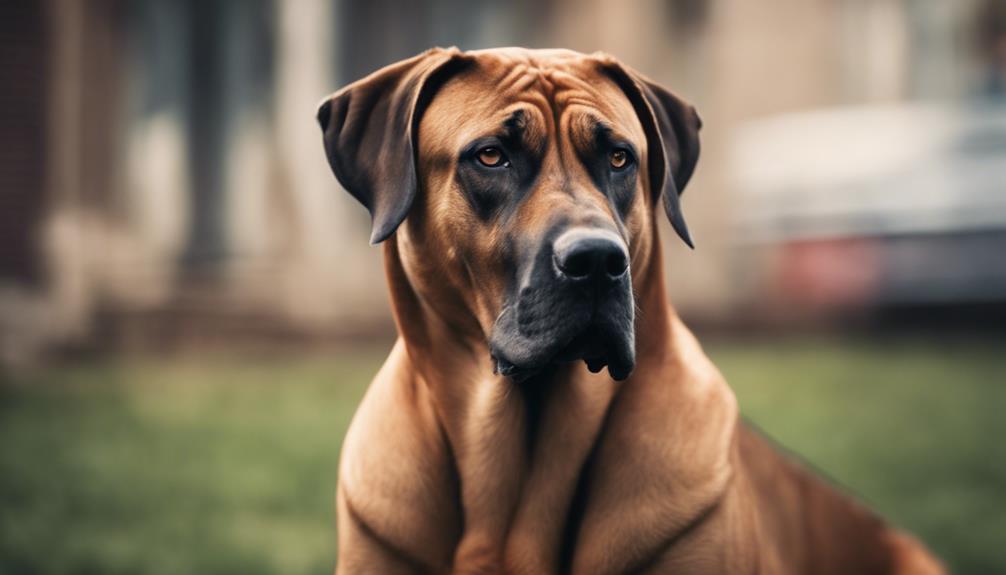
The Mastifridge breed, a mix between a Mastiff and a Rhodesian Ridgeback, presents a robust and athletic appearance, characterized by their substantial size and powerful build. These mixes typically weigh over 100 pounds and stand 25-29 inches tall, showcasing their large and chunky appearance. Here are some key characteristics of the Mastifridge mix:
- Independent Personalities: Mastifridge dogs have independent personalities and tend to operate on their own schedules, making consistent training and guidance essential for their development.
- Strong Prey Drive: They exhibit a strong prey drive, necessitating leash training to manage their instincts and ensure they can be controlled during walks.
- Affectionate: While displaying independence, Mastifridge mixes are known to be affectionate with their family members, forming strong bonds and being loyal companions.
- Reserved with Strangers: Mastifridge dogs may show indifference towards strangers, emphasizing their protective nature towards their family and making them reliable watchdogs.
Mastiffman: Mastiff Doberman Mix
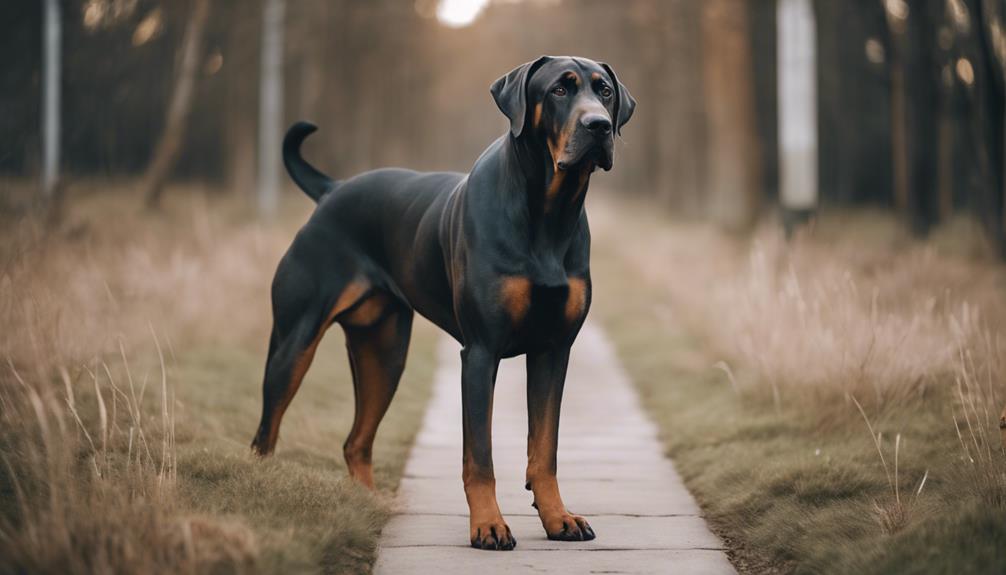
Mastiffman, the Mastiff Doberman mix, presents a blend of unique traits that set it apart in the realm of mixed breeds. As an owner, you can expect Mastiffman to exhibit characteristics such as loyalty, protectiveness, and a gentle nature towards family members. To ensure the well-being of your Mastiffman, it is crucial to adhere to specific care tips tailored to its large size and protective instincts.
Unique Traits of Mastiffman
Bringing together the robust guarding instincts of the Mastiff and the agility of the Doberman, this unique breed blend, known as Mastiffman, exhibits remarkable protective traits and unwavering loyalty towards its family members. Mastiffman, a Mastiff Doberman Mix, is a great guard dog with a gentle and affectionate nature. Here are some unique traits of Mastiffman:
- Known for their protective instincts and loyalty towards family members.
- Typically 25-30 inches tall and weigh between 85-180 pounds.
- Gentle and affectionate towards smaller family members.
- Soft, cuddly companion with a medium-length coat in Rottweiler colors.
Training Mastiffman requires assertiveness due to their size and strength, emphasizing the importance of early socialization and obedience training for their development.
Care Tips for Mastiffman
Implementing proper socialization techniques is crucial for the well-being and development of your Mastiffman, a Mastiff Doberman mix. As a guard dog, Mastiffman's protective instincts can be honed through positive interactions with other animals and people. Due to its affectionate and gentle nature, ensure that your Mastiffman receives ample love and attention to foster its bond with you and your family. Regular exercise is essential for this loyal and formidable companion to maintain a healthy weight and stimulate its mind. Engage Mastiffman in activities that challenge its intelligence and strength, as this mix breed thrives on mental and physical stimulation. By providing the right care, you can help your Mastiffman showcase its unique blend of qualities while ensuring a happy and fulfilling life.
French Mastiff: French Bulldog Mastiff Mix
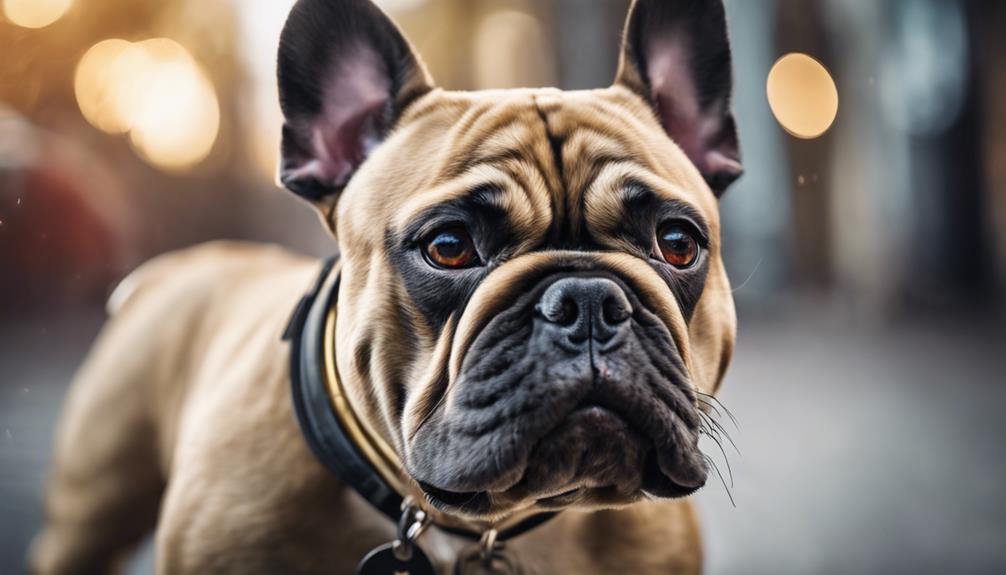
The French Mastiff mix, when crossed with a French Bulldog, presents a unique combination of traits inherited from both parent breeds. This mix is likely to exhibit a fascinating blend of characteristics that can make them wonderful companions with the right care and training. Here are some key points to consider:
- Strong and Protective Nature: The French Mastiff mix may inherit the protective instincts of the French Mastiff, making them excellent guard dogs if socialized and trained properly.
- Loyal Temperament: With the loyalty of both parent breeds, this mix is likely to form strong bonds with their family members and be devoted companions.
- Distinctive Physical Features: They may display a mix of the French Mastiff's wrinkly skin and the French Bulldog's unique bat-like ears, giving them a charming appearance.
- Need for Early Socialization and Training: Due to their potential size and guarding instincts, early socialization and consistent training are crucial to help them become well-behaved and manageable pets.
Golden Stiffiever: Golden Retriever Mastiff Mix
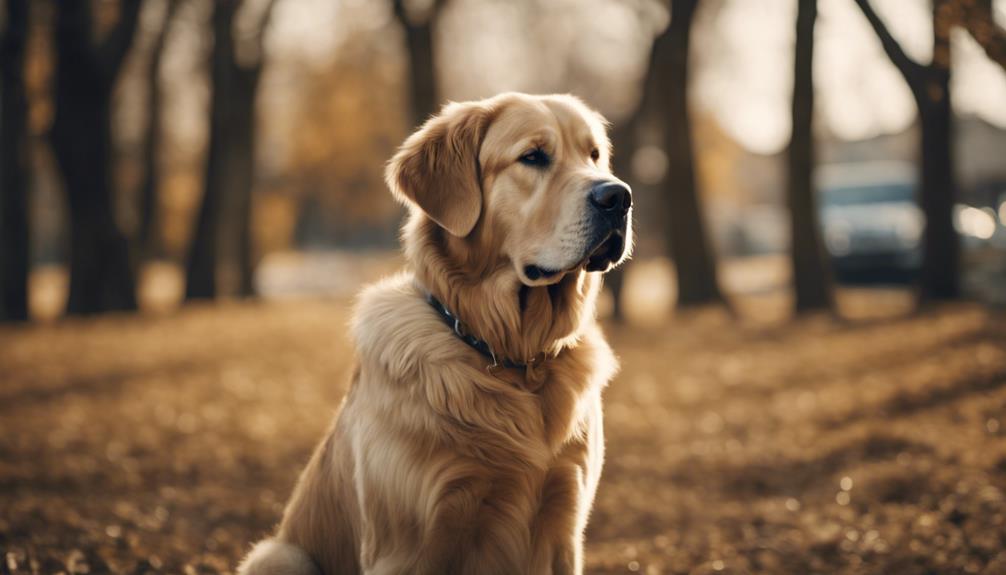
The Golden Stiffiever, a crossbreed between a Golden Retriever and a Mastiff, embodies a harmonious blend of friendliness and loyalty in its temperament. This mix inherits traits like intelligence and playfulness from the Golden Retriever parent, making it an excellent companion for families. The Golden Stiffiever typically falls within the medium to large size range, with its exact size dependent on the dominant genes inherited from each parent breed.
To ensure the well-being of a Golden Stiffiever, regular exercise and mental stimulation are essential. These dogs thrive on being active and engaged, so incorporating daily walks, playtime, and interactive toys into their routine is crucial. Due to their friendly and loyal nature, Golden Stiffievers form strong bonds with their owners and are known to be protective of their families.
When it comes to grooming, the Golden Stiffiever may have moderate shedding levels and require regular coat maintenance. Brushing their coat a few times a week can help minimize shedding and keep their fur in good condition. Overall, the Golden Stiffiever is a wonderful mix breed that combines the best qualities of the Golden Retriever and Mastiff, making them loving, devoted companions for those willing to provide them with the care and attention they need.
Bernese Mastiff: Bernese Mountain Dog Mastiff Mix
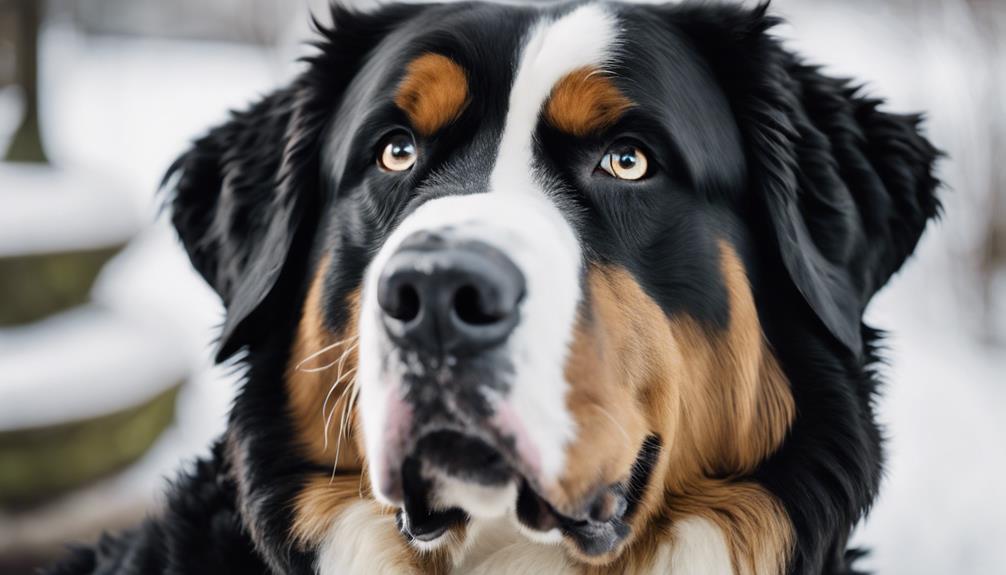
In exploring the Bernese Mastiff, you encounter a captivating blend of the Bernese Mountain Dog and Mastiff breeds, known for their distinct characteristics and unique appearance. Bernese Mastiff mixes can have longer hair, a trait inherited from the Bernese Mountain Dog parent breed. This feature adds to their fluffy appearance, making them quite striking.
When it comes to temperament, Bernese Mastiff mixes are renowned for being friendly and family-oriented. Their affectionate nature makes them excellent companions for families, especially those with children. However, potential owners should be aware that these mixes could inherit stubbornness from the Mastiff parent, requiring consistent training and patience.
Due to their size and strength, experience with larger breeds is recommended for handling Bernese Mastiff mixes. Proper training and socialization are crucial to ensure they grow into well-behaved and well-adjusted dogs.
In terms of appearance, Bernese Mastiff mixes often resemble a fluffy Mastiff or Saint Bernard, showcasing a unique blend of traits that make them stand out in the canine world. Their striking looks and loving personalities make them a popular choice for those seeking a loyal and affectionate companion.
Frequently Asked Questions
What Is the Smartest Mastiff Breed?
The smartest Mastiff breed is the Mastiff Shepherd, combining German Shepherd intelligence with Mastiff protection. Mastiff Shepherds excel in intelligent training, problem-solving, quick learning, and advanced commands. They thrive on mental stimulation and challenges, showcasing the smartest behaviors.
What Is the Rarest Mastiff?
The rarest Mastiff breed is the Tosa Inu Mastiff. While English Mastiff, Neapolitan Mastiff, Bullmastiff, Tibetan Mastiff, Spanish Mastiff, French Mastiff, Cane Corso, and Boerboel are popular, the Tosa Inu stands out for its history and strength.
What Is the Most Loving Mastiff?
When looking for the most loving Mastiff, you'll find a gentle giant in the Mastidoodle. This affectionate companion is a family favorite, a cuddly giant that doubles as a loving protector. They're loyal friends, playful giants, and giant sweethearts all rolled into one.
What Is the Most Agile Mastiff Breed?
Boost your Mastiff Mix's agility through a mix of athletic abilities, agility training, and exercise routines. High energy levels require fast movements, flexibility training, and coordination skills. Engage in competitive sports to enhance your pet's overall well-being.
Conclusion
You may be concerned about the potential health issues that come with owning a Mastiff mix breed, but with proper care and regular vet check-ups, you can ensure a happy and healthy life for your furry friend. By understanding their specific needs and characteristics, you can provide the best environment for them to thrive. Remember, the unique traits and qualities of Mastiff mixes make them a wonderful addition to any family.
